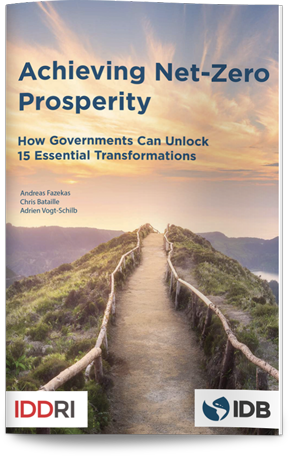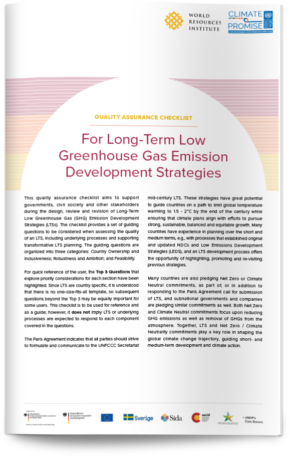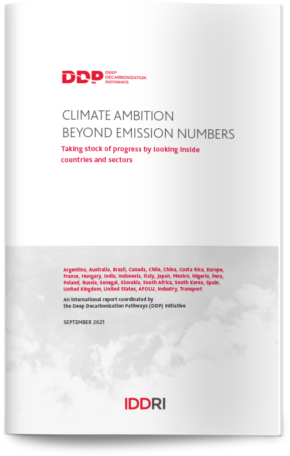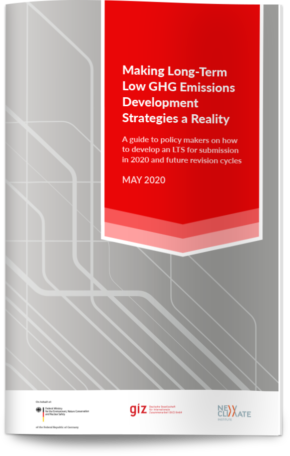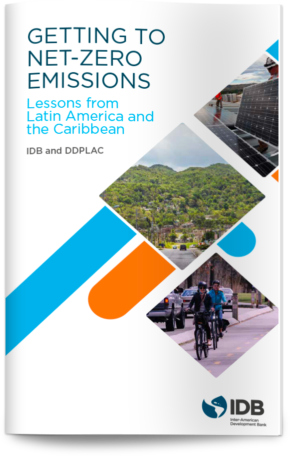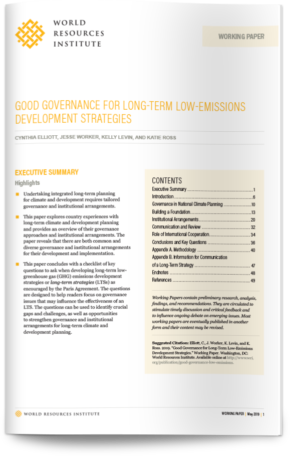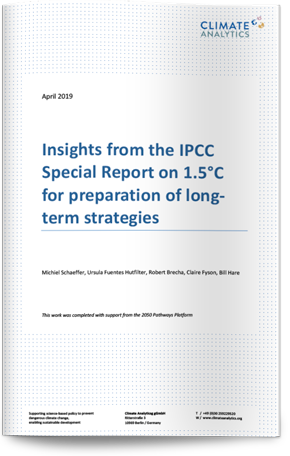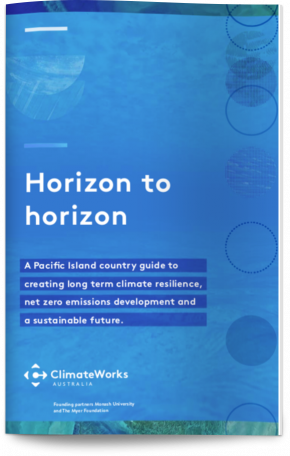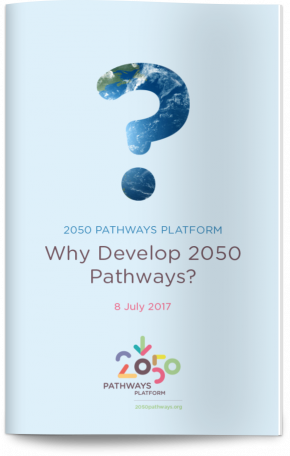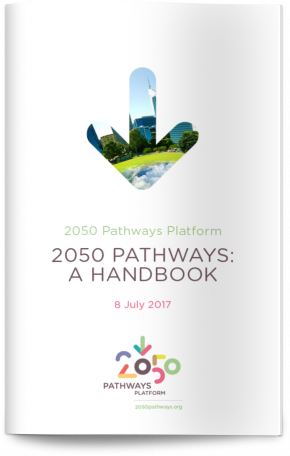Resources
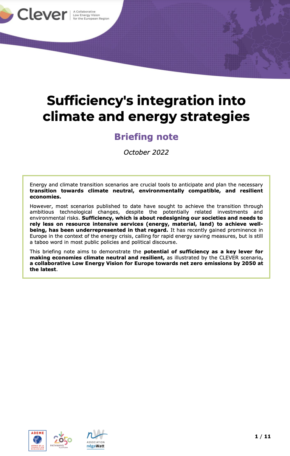
This briefing note, published by négaWatt, aims to demonstrate the potential of sufficiency as a key lever for making economies climate neutral and resilient. This is illustrated by the CLEVER scenario, a collaborative Low Energy Vision for Europe towards net zero emissions by 2050 at the latest.
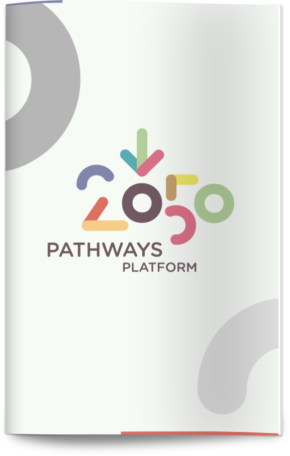
2022 November
Enhancing Long-term Low-Emission Development Strategies
These three guidance notes from the 2050 Pathways Platform, and prepared with analytical support from Vivid Economics, provide guidance on ways countries can advance the inclusion of adaptation, AFOLU and macroeconomics and finance in their long-term strategies.
2022 October
This publication lays out 15 sectorial and industry transformations that can help achieve net zero greenhouse gas emissions, the barriers that have so far hampered their implementation, and case studies of different government interventions that can be applied to tackle these obstacles. The paper is available in English, Spanish, and French.
2022 July
This report can be seen as a user’s guide for developing an LTS in the context of Least Developed Countries (LDCs). The paper addresses some of the challenges LDCs face in preparing and implementing LTSs, including limited data availability to support economic and socio-economic modelling, human and financial resource constraints and limited institutional capacities. It considers key building blocks of an LTS and identifies the key sectors to be addressed through an LTS, which for most LDCs include the energy sector, the agricultural sector and the land sector. It then highlights some of the important co-benefits that can be derived from LDC preparation and implementation, and outlines some of the resources and support available for preparation and implementation of LTS.
2021 October
This checklist developed by UNDP and WRI provides guiding questions for governments, civil society, and other stakeholders they can use during the design, review, and revision of their Long-Term Low Greenhouse Gas (GHG) Emission Development Strategies (LTS). The questions consider that each country has unique national contexts and can be applied to assess LTS in different national circumstances.
2021 September
This study conducted by 40 international experts assesses climate ambition and national transformations in 26 countries and three sectors (land use, transport, and industry), taking a deeper look beyond a country’s Nationally Determined Contribution (NDC) to reveal broader, sector-specific global trends and developments in mitigation, and to gauge the progress enabled by the Paris Agreement. The report highlights the importance of strengthening policy design for national and sectoral processes, connecting international cooperation to sectoral transformations, and enabling sectoral conversations to accelerate the transition. Finally, the study makes the case for high-level political negotiations.
2020 May
This guidance provides recommendations to policy makers on how to approach the development of a long-term low greenhouse gas emission development strategy (LTS) given the unique circumstances of individual countries in 2020, and future revisions thereof.
2019 December
Getting to Net-Zero Emissions takes stock of the lessons learnt from the experiences of country teams implementing the ongoing Inter-American Development Bank-led Deep Decarbonization Pathways in Latin America and the Caribbean Project (DDP-LAC) and proposes approaches to developing and delivering long-term pathways to net-zero emissions by 2050.
2019 June
Long-term planning for climate and development requires tailored governance and institutional arrangements. This paper considers what type of governance and institutional arrangements can best support the development of long-term, low-emissions development strategies in order to bridge long-term climate implications to the decisions of today.
2019 April
This briefing lays out the key findings of the IPCC SR15 that inform governments in their task to develop and submit LT-LEDS, and inform the continuous scaling up of near- and mid-term action and targets, including in Nationally Determined contributions (NDCs), in line with the ratcheting-up mechanism enshrined in the Paris Agreement.
2019 April, 17
The C40 Climate Action Planning Resource Centre has been designed to support city climate planners worldwide to deliver ambitious climate action in line with the objectives of the Paris Agreement. The Platform brings together a wide range of resources – including video tutorials, guidance documents, research reports, case studies, and tools – that build upon the experiences of 73 cities across North America, Latin America, Africa, Europe, Asia, and the Pacific. New resources and tools are added as they become available. The Knowledge Hub offers insights and practical resources from leading C40 cities.
2018 October, 10
Horizon to Horizon guide outlines a step by step process to designing a long-term strategy for Pacific Island countries, identifying and solving roadblocks to implementation, and determining financing needs and sources.
A Strategic Mitigation, Adaptation and Resilience Tool (SMART) accompanies the Horizon to Horizon guide. SMART supports decision making by Pacific leaders, by enhancing the understanding of where mitigation actions interact with adaptation and resilience priorities.
2017 July, 8
This paper presents the possible motivations for countries, regions, cities, and other entities to develop 2050 pathways, as visions of their long-term low- greenhouse gas emissions development. It is intended to be read together with: 2050 Pathways: A Handbook. These papers are the first in a series of papers from the 2050 Pathways Platform and its partners. Other papers will follow on more specific issues related to the design and implementation of 2050 pathways. This paper is under the responsibility of the 2050 Pathways Platform secretariat and does not commit the Platform members or its partners.
This paper was written by Siddharth Pathak (Partnerships Director, 2050 Pathways Platform).
The author thanks Richard Baron (Executive Director, 2050 Pathways Platform) and Emmanuel Guérin (Executive Director for Global Policies, European Climate Foundation) for guidance and suggestions. The 2050 Pathways Platform is also grateful to the following for their useful comments on an earlier draft: Amal-Lee Amin and Adrien Vogt-Schilb, Kelly Levin, Stephan Hallegatte, Celine Ramstein, Miles Perry, Anna Broadhurst, Gwenaël Podesta, Laura Aylett, Nicole Kranz, Christina Paradiso, Felipe Osses Mcintyre, Emmanuelle Pinault, Damien Navizet, Yunus Arikan, Pedro Faria, Ron Beniof, Sara Berggren and Roger Ramer.
2017 July, 8
This technical paper presents guidance on how to conduct 2050 pathways analyses. It suggests criteria, principles and building blocks for a successful development of pathways, as well as selected illustrations. It is intended to be read together with: Why Develop 2050 Pathways? This paper is under the responsibility of the 2050 Pathways Platform secretariat and does not commit the Platform members or its partners. Figures and illustrations including those from the Deep Decarbonization Pathways Project do not represent government positions.
The paper was written by Jim Williams (SDSN) and Henri Waisman (IDDRI).
The authors thank Richard Baron (Executive Director, 2050 Pathways Platform) and Emmanuel Guérin (Executive Director for Global Policies, European Climate Foundation) for their guidance and suggestions. The 2050 Pathways Platform is also grateful to the following for their useful comments on an earlier draft: Raul Alfaro-Pelico, Laura Aylett, Ron Benioff, Anna Broadhurst, Sadie Cox, Anita Demuth, Stéphane Hallegatte, Minako Kageyama, Noah Kaufman, Nicole Kranz, Amal-Lee Amin, Kelly Levin, Damien Navizet, Felipe Osses McIntyre, Christina Paradiso, Miles Perry, Gwenaël Podesta, Céline Ramstein, Ophélie Risler and other colleagues at AFD, Adrien Vogt-Schilb, Sebastian Wienges and participants in the Pocantico meeting.
